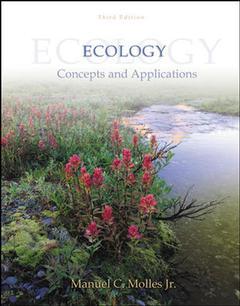Description
Ecology with olc card (3rd ed )
Author: MOLLES
Language: English
Approximative price 54.68 €
Subject to availability at the publisher.
Add to cart
Publication date: 03-2004
· 21.6x27.4 cm · Soft-cover
· 21.6x27.4 cm · Soft-cover
Description
/li>Contents
/li>
This introductory general ecology text features a strong emphasis on helping students grasp the main concepts of ecology while keeping the presentation more applied than theoretical. An evolutionary perspective forms the foundation of the entire discussion. Evolution is brought to center stage throughout the book, as it is needed to support understanding of major concepts. The discussion begins with a brief introduction to the nature and history of the discipline of ecology, followed by section I, which includes two chapters on natural history'life on land and life in water. The intent is to establish a common foundation of natural history upon which to base the later discussions of ecological concepts. The introduction and natural history chapters can stand on their own and should be readily accessible to most students. They may be assigned as background reading, leaving 17 chapters to cover in a one-semester course. Sections II through VI build a hierarchical perspective: section II concerns the ecology of individuals: section III focuses on population ecology, section IV presents the ecology of interactions, section V summarizes community and ecosystem ecology, and finally, section VI discusses large-scale ecology and includes chapters on landscape, geographic, and global ecology. These topics were first introduced in section I within a natural history context. In summary, the book begins with the natural history of the planet, considers portions of the whole in the middle chapters, and ends with another perspective of the entire planet in the concluding chapter.
1 Introduction: What is Ecology? I Natural History 2 Life on Land 3 Life in Water II Individuals 4 Temperature Relations 5 Water Relations 6 Energy and Nutrient Relations 7 Social Relations III Population Ecology 8 Population Genetics and Natural Selection 9 Population Distribution and Abundance 10 Population Dynamics 11 Population Growth 12 Life Histories IV Interactions 13 Competition 14 Exploitation: Predation, Herbivory, Parasitism, and Disease 15 Mutualism V Communities and Ecosystems 16 Species Abundance and Diversity 17 Food Webs 18 Primary Production and Energy Flow 19 Nutrient Cycling and Retention 20 Succession and Stability VI Large-Scale Ecology 21 Landscape Ecology 22 Geographic Ecology 23 Global Ecology
© 2024 LAVOISIER S.A.S.




